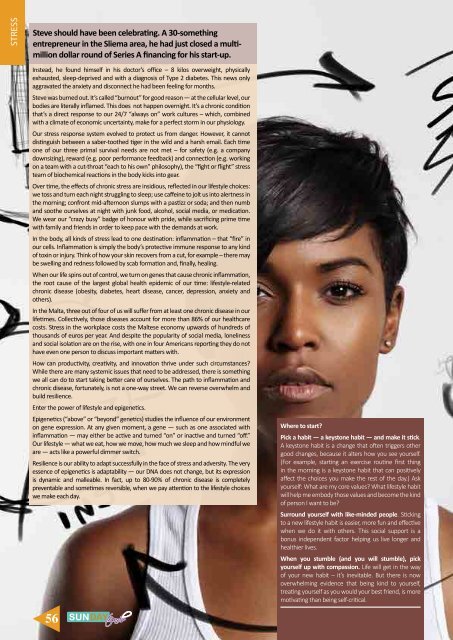Sunday Trends
You also want an ePaper? Increase the reach of your titles
YUMPU automatically turns print PDFs into web optimized ePapers that Google loves.
STRESS<br />
Steve should have been celebrating. A 30-something<br />
entrepreneur in the Sliema area, he had just closed a multimillion<br />
dollar round of Series A financing for his start-up.<br />
Instead, he found himself in his doctor’s office – 8 kilos overweight, physically<br />
exhausted, sleep-deprived and with a diagnosis of Type 2 diabetes. This news only<br />
aggravated the anxiety and disconnect he had been feeling for months.<br />
Steve was burned out. It’s called “burnout” for good reason — at the cellular level, our<br />
bodies are literally inflamed. This does not happen overnight. It’s a chronic condition<br />
that’s a direct response to our 24/7 “always on” work cultures – which, combined<br />
with a climate of economic uncertainty, make for a perfect storm in our physiology.<br />
Our stress response system evolved to protect us from danger. However, it cannot<br />
distinguish between a saber-toothed tiger in the wild and a harsh email. Each time<br />
one of our three primal survival needs are not met – for safety (e.g. a company<br />
downsizing), reward (e.g. poor performance feedback) and connection (e.g. working<br />
on a team with a cut-throat “each to his own” philosophy), the “fight or flight” stress<br />
team of biochemical reactions in the body kicks into gear.<br />
Over time, the effects of chronic stress are insidious, reflected in our lifestyle choices:<br />
we toss and turn each night struggling to sleep; use caffeine to jolt us into alertness in<br />
the morning; confront mid-afternoon slumps with a pastizz or soda; and then numb<br />
and soothe ourselves at night with junk food, alcohol, social media, or medication.<br />
We wear our “crazy busy” badge of honour with pride, while sacrificing prime time<br />
with family and friends in order to keep pace with the demands at work.<br />
In the body, all kinds of stress lead to one destination: inflammation – that “fire” in<br />
our cells. Inflammation is simply the body’s protective immune response to any kind<br />
of toxin or injury. Think of how your skin recovers from a cut, for example – there may<br />
be swelling and redness followed by scab formation and, finally, healing.<br />
When our life spins out of control, we turn on genes that cause chronic inflammation,<br />
the root cause of the largest global health epidemic of our time: lifestyle-related<br />
chronic disease (obesity, diabetes, heart disease, cancer, depression, anxiety and<br />
others).<br />
In the Malta, three out of four of us will suffer from at least one chronic disease in our<br />
lifetimes. Collectively, those diseases account for more than 86% of our healthcare<br />
costs. Stress in the workplace costs the Maltese economy upwards of hundreds of<br />
thousands of euros per year. And despite the popularity of social media, loneliness<br />
and social isolation are on the rise, with one in four Americans reporting they do not<br />
have even one person to discuss important matters with.<br />
How can productivity, creativity, and innovation thrive under such circumstances?<br />
While there are many systemic issues that need to be addressed, there is something<br />
we all can do to start taking better care of ourselves. The path to inflammation and<br />
chronic disease, fortunately, is not a one-way street. We can reverse overwhelm and<br />
build resilience.<br />
Enter the power of lifestyle and epigenetics.<br />
Epigenetics (“above” or “beyond” genetics) studies the influence of our environment<br />
on gene expression. At any given moment, a gene — such as one associated with<br />
inflammation — may either be active and turned “on” or inactive and turned “off.”<br />
Our lifestyle — what we eat, how we move, how much we sleep and how mindful we<br />
are — acts like a powerful dimmer switch.<br />
Resilience is our ability to adapt successfully in the face of stress and adversity. The very<br />
essence of epigenetics is adaptability — our DNA does not change, but its expression<br />
is dynamic and malleable. In fact, up to 80-90% of chronic disease is completely<br />
preventable and sometimes reversible, when we pay attention to the lifestyle choices<br />
we make each day.<br />
56<br />
Where to start?<br />
Pick a habit — a keystone habit — and make it stick.<br />
A keystone habit is a change that often triggers other<br />
good changes, because it alters how you see yourself.<br />
(For example, starting an exercise routine first thing<br />
in the morning is a keystone habit that can positively<br />
affect the choices you make the rest of the day.) Ask<br />
yourself: What are my core values? What lifestyle habit<br />
will help me embody those values and become the kind<br />
of person I want to be?<br />
Surround yourself with like-minded people. Sticking<br />
to a new lifestyle habit is easier, more fun and effective<br />
when we do it with others. This social support is a<br />
bonus independent factor helping us live longer and<br />
healthier lives.<br />
When you stumble (and you will stumble), pick<br />
yourself up with compassion. Life will get in the way<br />
of your new habit – it’s inevitable. But there is now<br />
overwhelming evidence that being kind to yourself,<br />
treating yourself as you would your best friend, is more<br />
motivating than being self-critical.

















